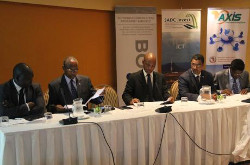Six African countries have set up Internet Exchange Points (IXPs), after two years of the African Union’s African Internet Exchange System (AXIS) project, managed by the Internet Society.
Under the project, the Internet Society was to provide technical training to AU member countries. The initial engagement involved building a local stakeholder driven process to start the dialogue for countries without IXPs with an end goal of establishing a national IXP based on global best practices. The second part involved initiating a regional process to support the growth of existing national IXPs and ISPs to become Regional IXPs (RIXPs) and Regional Internet carriers (RICs) respectively. Technical training was held in 28 countries, attracting more than 500 participants.
“This is the first major initiative in Africa that has utilised the multi-stakeholder approach towards the implementation of IXPs. Governments have played a facilitative role towards the establishment of IXPs in five countries launched in 2014 and are actively involved in the 3 preparing to be launched in 2015. As a result, there has been more IXPs launched in the last 12 months than in the 5 years before,” said Michuki Mwangi, Internet Society’s Senior Development Manager for Africa.
The new IXPs are in Namibia, Burundi, Swaziland, Gambia, Gabon and Seychelles. Africa currently has 33 IXPs and according to Packet Clearing House (PCH), Africa’s domestic bandwidth production grew by 145 percent, from 113Gigabits in April last year to 277 Gigabits in April this year.
The engagement in countries involved bringing together government representatives, ISPs, content, research and education network operators, amongst others likely to be peering at the exchange. The countries also received, technical trainings that involved assessment of technical preparedness for networks expected to participate, discussion on benefits of setting up an IXP and benefits of getting Internet resources IP addresses and Autonomous System Numbers (ASNs) from AFRINIC.
“The five workshops at the regional level achieved their goal, which was to enhance interconnectivity within the region, encourage local content development and data localization by promoting investments in data hosting infrastructures and data centers as well as through cost-saving peering and content distribution mechanisms,” said the final report forwarded to the AU.
In terms of availability of technical experts in the area of IXPs, Africa is still considered lower than other regions, which means AXIS training has produced a high number of experts.
“The number of people trained and countries covered in the project was more than in the entire history of Africa and IXPs,” said Michuki Mwangi “Through the project we have developed a pool of subject matter experts in the African region. In addition, the process has enabled us to attach regional and international experts, to continue supporting the respective countries through their efforts to establish the IXP.”
This article was originally published by Internet Society. Read the original article.

